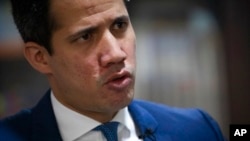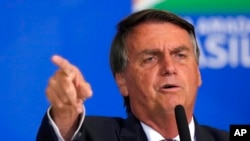President Joe Biden reaffirmed U.S. support for Juan Guaido during a phone call Wednesday, despite not inviting the Venezuelan opposition leader to the Summit of the Americas, a gathering of leaders from the countries of North, South and Central America and the Caribbean that he is hosting in Los Angeles.
Biden made the call to Guaido on board Air Force One en route to Los Angeles. In a statement released after the call, the White House said Biden underscored U.S. “recognition of and support for the 2015 democratically elected National Assembly and Guaido as the interim president of Venezuela,” and expressed support for “Venezuelan-led negotiations as the best path toward a peaceful restoration of democratic institutions, free and fair elections.”
Biden also signaled the U.S. was willing to reduce sanctions on President Nicolas Maduro’s government if the embattled Venezuelan leader reached a compromise with his opposition. Maduro is one of the Latin American leaders deemed nondemocratic and excluded by Washington from the summit.
“We thought the best way to lift up our desire to see that Venezuelan-led dialogue and, ultimately, a better future for the Venezuelan people was to focus on the invitations to Venezuelan civil society activists, who will participate in various aspects of the summit,” national security adviser Jake Sullivan told reporters traveling with Biden on board Air Force One.
The U.S. also did not invite President Miguel Diaz-Canel of Cuba and President Daniel Ortega of Nicaragua, after determining that the two governments also did not meet the requirements of the 2001 Inter-American Democratic Charter that enshrines democracy as a core value. The exclusions have led to summit boycotts by the leaders of Guatemala, Honduras, Mexico and others who say the gathering must be more inclusive.
The U.S. under the Trump administration recognized Guaido as Venezuela’s legitimate president after the country’s 2018 presidential election, in which wide irregularities were reported. The Trump administration sought to galvanize governments to support Guaido, ramped up sanctions against Venezuela, and floated the idea of invading the country to remove Maduro from power.
Guaido’s office released a statement thanking the U.S. and said, “The growing Venezuelan migration will only stop when there is a transition to democracy.”
A U.N. report estimated in March 2019 that 94% of Venezuelans lived in poverty, and by 2021 almost 20% of Venezuelans (5.4 million) had left their country.
Biden and leaders are expected to sign a regional migration pact later this week, which the White House says is designed to support communities hosting migrants.
Meeting with Brazilian leader
On the sidelines of the summit, Biden is scheduled to meet Brazilian President Jair Bolsonaro, who earlier also threatened to skip the summit.
The Associated Press reported that the administration was able to secure the meeting on the condition that Biden does not raise the issue of deforestation or questions about Brazilian election integrity. The White House did not respond to VOA’s request for confirmation.
Brazil is the largest economy in Latin America, and this would be the leaders’ first bilateral meeting. Bolsonaro, a right-wing populist and Trump admirer, announced a freeze in Brazil-U.S. ties when Biden took office in January 2021.
“The Biden government has a delicate relationship with Bolsonaro,” said Luiza Duarte, a fellow at the Brazil Institute, Wilson Center. “Hosting the Summit of Americas without Mexico and Brazil, the two larger countries in Latin America, would represent an even bigger diplomatic fiasco.”
For Bolsonaro, who is campaigning for reelection, a meeting with Biden will strengthen his argument that Brazil is not isolated internationally under his leadership, Duarte told VOA.
So far Bolsonaro has not indicated plans to reverse a pattern of undermining environmental protection in Brazil and putting indigenous populations at risk. Observers will be watching how Brazil reacts to the climate initiatives that Biden is set to launch at the summit.
Observers will also be looking at whether Brazil — a top oil exporter — can help reduce pressures on energy costs in the wake of Russia’s invasion of Ukraine. Argentina, Colombia and Mexico have increased oil exports to the U.S., but Brazil has not.






